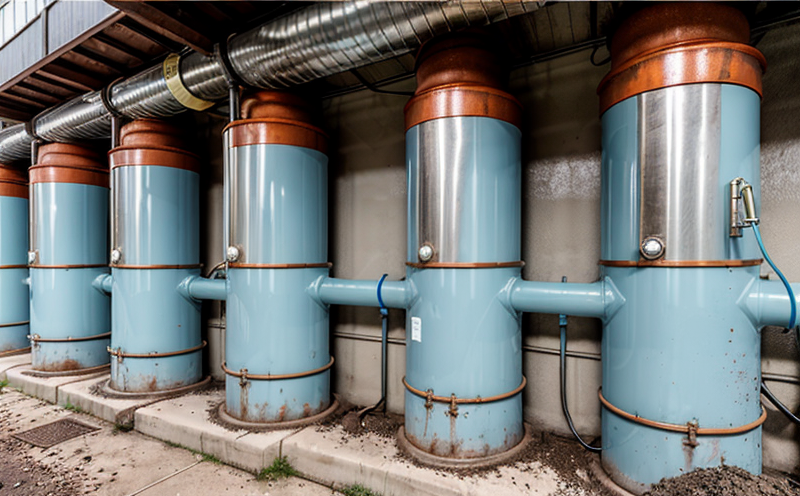Corrosion, Scaling & Deposit Testing in Water Systems
The integrity and longevity of water systems are critical to infrastructure resilience. Corrosion, scaling, and deposits can lead to significant operational issues such as reduced flow rates, increased maintenance costs, and potential safety hazards. Understanding these factors is crucial for maintaining optimal performance across various sectors including municipal water supply, industrial processes, and environmental management.
Corrosion testing in water systems involves assessing the degradation of materials due to chemical reactions with the aqueous environment. This can lead to leaks or structural failures which are not only costly but also pose risks to public safety. Scaling refers to the accumulation of insoluble substances within pipes and equipment, affecting heat transfer efficiency and potentially causing blockages. Deposits, on the other hand, can form due to particulate matter suspended in water, leading to clogs and reduced performance.
In water systems, the presence of corrosive elements such as chloride ions or the formation of iron oxides (rust) from dissolved oxygen is a primary concern. The testing process typically involves extracting samples from critical points within the system, subjecting them to controlled conditions designed to mimic real-world scenarios. This allows for precise measurement and analysis of corrosion rates, scaling indices, and deposit thicknesses.
For accurate assessment, various techniques are employed including potentiometric measurements for galvanic corrosion testing, ultrasonic imaging for scaling evaluation, and X-ray fluorescence spectroscopy (XRF) for elemental composition analysis. The use of standardized protocols ensures consistency with international standards such as ASTM G58-10 for galvanic couples used in assessing chloride-induced stress corrosion cracking.
Understanding these parameters helps quality managers implement effective preventive measures like selecting appropriate materials, optimizing chemical dosages, and scheduling regular maintenance checks. Compliance officers can rely on this data to ensure adherence to regulatory requirements set forth by bodies like the Environmental Protection Agency (EPA).
R&D engineers benefit greatly from such detailed insights as they explore new technologies aimed at enhancing system reliability while minimizing environmental impact. Procurement teams can leverage these findings when sourcing materials and components, ensuring long-term compatibility with existing infrastructure.
Why It Matters
The significance of corrosion, scaling, and deposit testing extends far beyond mere operational efficiency; it plays a pivotal role in safeguarding public health and safety. Municipal water supplies are particularly vulnerable to these issues given their extensive networks which traverse diverse geographies. Any compromise in the structural integrity could result in contamination events affecting millions.
For industrial processes relying heavily on water systems, downtime due to equipment failure or operational inefficiencies can translate into substantial financial losses. Moreover, the environmental footprint of these systems necessitates sustainable practices that extend beyond just functional reliability. By addressing corrosion and scaling concerns early, organizations not only enhance their bottom line but also contribute positively towards global sustainability goals.
The implications reach deeper into local communities where access to safe drinking water is a basic human right. Ensuring robust infrastructure supports this fundamental need, thereby fostering trust between service providers and consumers alike.
From an economic perspective, the cost savings associated with early detection and mitigation of these issues far outweigh the expenses incurred during reactive repairs or replacements. This underscores the importance of proactive management through regular testing and monitoring programs.
Finally, regulatory compliance becomes easier when backed by reliable data from comprehensive testing protocols. It allows stakeholders to demonstrate adherence to stringent standards set forth by relevant authorities without compromising on quality.
Eurolab Advantages
At Eurolab, we pride ourselves on offering unparalleled expertise in water and wastewater testing services. Our team comprises seasoned professionals with deep-rooted experience across multiple domains, ensuring accurate results every time. Leveraging state-of-the-art equipment and cutting-edge methodologies, our laboratories provide precise measurements tailored specifically to your unique requirements.
Our commitment to excellence is reflected in the ISO/IEC 17025 accreditation of our facilities, guaranteeing that all tests conducted meet the highest industry standards. We also offer flexible turnaround times to accommodate diverse project schedules without sacrificing accuracy or quality.
Beyond technical proficiency, Eurolab prioritizes client satisfaction by offering comprehensive consultative services. Our experts work closely with clients throughout the testing process, providing valuable insights and recommendations based on our findings. This holistic approach ensures that not only do you receive accurate results but also actionable strategies for improvement.
In addition to our robust technical capabilities, Eurolab maintains strong partnerships with leading research institutions and industry leaders. These collaborations allow us to stay at the forefront of advancements in water system testing methodologies, ensuring that we bring innovative solutions to your challenges.
Environmental and Sustainability Contributions
The environmental impact of water systems cannot be overstated. By addressing corrosion, scaling, and deposit issues proactively, Eurolab contributes significantly towards reducing waste generation and resource depletion associated with frequent replacements or repairs. Our testing services help identify areas where improvements can be made, leading to more efficient use of resources and reduced carbon footprints.
Moreover, our efforts contribute positively to broader sustainability initiatives by promoting the lifecycle management of materials used in water systems. This includes recommending sustainable alternatives that are both durable yet eco-friendly, thereby supporting greener practices throughout the industry.
The insights gained from Eurolab’s testing services also enable stakeholders to comply with increasingly stringent environmental regulations without compromising on operational efficiency or safety standards. By providing robust data and recommendations, we empower organizations to make informed decisions that balance economic viability with ecological responsibility.





